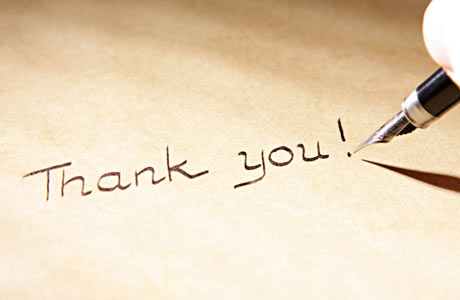On Saying Thank You
-
March 28, 2017
- Posted by: Chaloner

Today’s #takemebacktuesday recounts the importance of saying thanks.
It is only natural to breathe a sigh of relief coming out of a big interview or meeting that you think has gone well, but your work isn’t quite done. Don’t forget the final and significant step: a prompt follow up. In the professional world, a thank you note should not be an afterthought or a casual gesture, it’s part and parcel of your candidacy.
After one of our clients delayed considering a candidate who failed to send a thank you note after an interview, we conducted a survey to see just how important follow-through is to hiring managers and human resources professionals across the board. Recently we reached out to over 50 people from all different industries who had hired at least three communications professionals in the last year (including some who hired many more). We were surprised to learn that over 75% of the people surveyed did not receive any kind of thank you note from most of the candidates they interviewed and for 30% of those surveyed, no follow up meant no further steps for the candidate. One hiring manager remarked, “The follow up is the lynchpin for me. If the interview goes well and I feel invigorated and excited about someone, I wait to see what kind of follow up efforts they put forth.”
Form
Our sources didn’t show a strong preference for email or snail mail, and both have their benefits. An email can be more timely but a handwritten note might really stand out. Quoted in a recent Times article on the subject, New York fashion publicist Cristiano Magni says, “It is so important, in a digital world, to have the dignity to sit down and write something in your own hand.” And when prompted further, many of our sources agreed that a hand-written note stands out as more personal, and there’s no denying it requires a bit more effort than its digital equivalent. Most important is just to do something within 24 hours of the interview.
Style
Receptiveness to creativity in the thank you note varies from company to company. One Director of Communications suggests, “Stick to the basics. Personally, I am less interested in a creative note and more interested in seeing the candidate put pen to paper and send a mistake-free and timely follow up note.” If you discussed something personal like travel, you might pick a card with a relevant theme. There is room for a personal touch in the tone and aesthetic of your note, but more attention should be given to what it is you want to say.
Content
Our Founder, Ted Chaloner, feels a good follow up communicates interest, confidence and enthusiasm. Thank the interviewer for his/her time and assert your belief in your ability to do the job. If there is any opportunity to follow up or close the loop on an issue or event that came up in your interview, seize this chance to do so. Ted recalls a candidate who invited him to an MIT Enterprise Forum. Ted went and found it really useful. Keep the note brief and precise; if you are writing to several different interviewers, make sure each note is different and specific to the recipient.
With so many factors outside of your control in a job search, seize the easy opportunity of a thank you note to demonstrate humility, confidence and passion. I met one candidate who carries stationary on her at all times and disciplines herself to write the note just after leaving a meeting so she can drop it in the mail right away! Consider this strategy if you are having a hard time getting in the practice of follow up. And don’t stress too much about the format; the gesture itself is what people remember.
Chaloner, founded in 1979 as Chaloner Associates, is a national executive search firm that focuses on recruiting mid- to senior-level communications, public relations, marketing and investor relations professionals.

